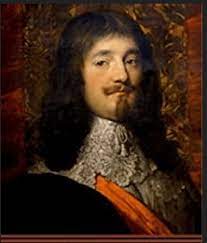My Soul, There is a Country, from Songs of Farewell by C H H Parry (1818-1918) Words Henry Vaughan (1622-1695)
This is the first of Parry's "Songs of Farewell" written about the needless suffering in war. It changes tempo from slow and somber to a more lilting, uplifting, dance like quality, back and forth during the piece. The choir sang it accompanied by our Director of Music.
C H H Parry was born in Bournemouth in 1848 into a rich family and was educated at Eton where he also gained his music degree. He went to study further at Oxford. His music influenced other great English composers such as Elgar and Vaughan Williams. He wrote his best music in his later years and this include his Songs of Farewell. He died in Rustington in 1918, just before the end of the Great War.
 |
Sir Charles Hubert Hastings Parry
From Wikipedia
Henry Vaughan (17 April 1621 – 23 April 1695) was a Welsh metaphysical poet, author and translator writing in English, and a medical physician. His religious poetry appeared in Silex Scintillans in 1650, with a second part in 1655. In 1646 his Poems, with the Tenth Satire of Juvenal Englished was published. Meanwhile he had been persuaded by reading the religious poet George Herbert to renounce "idle verse". The prose Mount of Olives and Solitary Devotions (1652) show his authenticity and depth of convictions. Two more volumes of secular verse followed, ostensibly without his sanction, but it is his religious verse that has been acclaimed. He also translated short moral and religious works and two medical works in prose. In the 1650s he began a lifelong medical practice.
It was not until the writing of Silex Scintillans that Vaughan received significant acclaim. The period shortly preceding the publication of the first volume of the work (1650) marked an important period of his life. Certain indications in the first volume and explicit statements in the preface to the second volume (1655) suggest that Vaughan suffered a prolonged sickness that inflicted much pain. Vaughan interprets this experience as an encounter with death that alerted him to a "misspent youth". Vaughan believed he had been spared to make amends and start a new course not only in his life but in the literature he would produce. He described his previous work as foul and a contribution to "corrupt literature". Perhaps the most notable mark of Vaughan's conversion is how much it is credited to George Herbert. Vaughan claims he is the least of Herbert's many "pious converts". It was during this period of Vaughan's life, around 1650, that he adopted the saying "Moriendo, revixi" – by dying, I gain new life.: p132
The first volume of Silex Scintillans was followed by The Mount of Olives, or Solitary Devotions (1652), a prose book of devotions providing prayers for various stages in the day, for prayer in church and for other purposes. It appears as a "companion volume" to the Book of Common Prayer, to which it alludes frequently, although it had been outlawed under the Commonwealth. The work was also influenced by Lancelot Andrewes's Preces Privatae (1615) and John Cosin's Collection of Private Devotions (1627). Flores Solitudinis (1654) contains translations from the Latin of two works by the Spanish Jesuit Juan Eusebio Nieremberg, one by a 5th-century Bishop of Lyon, Eucherius, and by Paulinus of Nola, of whom Vaughan wrote a prose life.
Vaughan practised medicine, perhaps as early as the 1640s. He attached to the second volume of Silex Scintillans (1655) a translation of Henry Nollius's Hermetical Physick. He went on to produce a translation of Nollius's The Chymists Key in 1657.
Taken from Wikipedia.
|


No comments:
Post a Comment